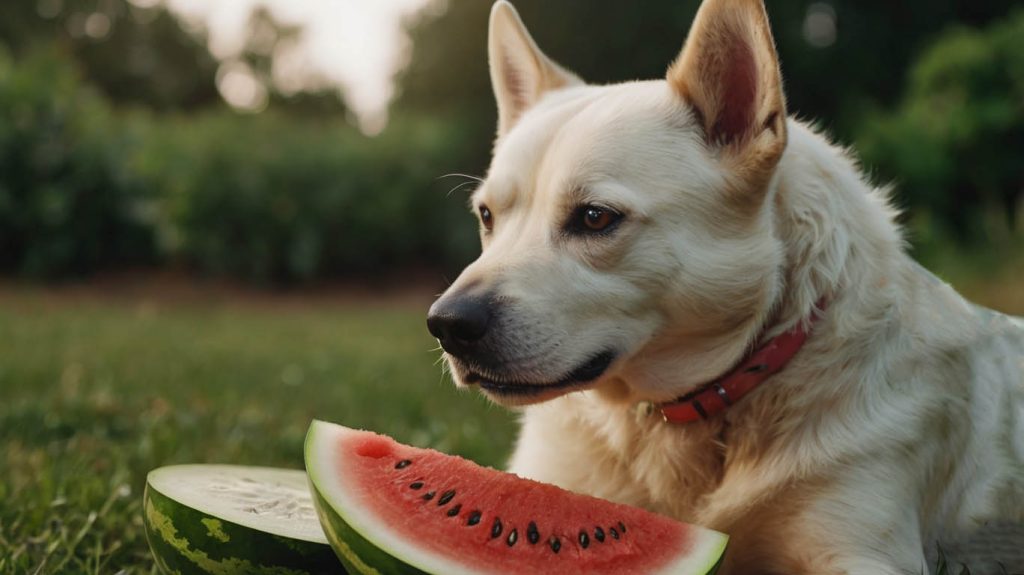The Definitive Answer: Is Watermelon Good for Dogs?
Imagine this: you’re at a summer picnic, and the star of the show is a perfectly chilled, ruby-red watermelon. As you enjoy a slice, you feel the familiar nudge of a wet nose and see those big, pleading eyes. Your dog wants in on the action. This leads to the all-important question every loving pet owner asks: Is watermelon good for dogs? It’s a moment of hesitation, balancing the desire to share a treat with the absolute need to keep our pets safe. The answer, backed by veterinarians, is a definitive yes—watermelon can be an incredibly healthy treat, but only if you follow some crucial safety rules.
This article will guide you through the complete story of watermelon for your canine companion. We will begin by uncovering the impressive nutritional benefits that make this fruit a fantastic snack. Subsequently, we will explore the serious, non-negotiable dangers of the seeds and rind. Furthermore, we will provide a clear, step-by-step guide on proper preparation and portion control. Consequently, you will leave with the confidence and knowledge to answer the question, “Is watermelon good for dogs?” for your own beloved pet.
Why You Need to Know if Watermelon is Good for Dogs
Before we explore the benefits, it’s essential to understand why this question is so significant. Dogs are not small humans; their digestive systems and nutritional needs are unique. Many “healthy” human foods are toxic to dogs—grapes, onions, and macadamia nuts are prime examples. Therefore, taking the time to research a new food is a cornerstone of responsible pet ownership. The great news is that when it comes to watermelon, you’ve stumbled upon one of the best fruits you can share, provided you do it correctly.

The Nutritional Benefits: Why Watermelon is Good for Dogs
Watermelon is far more than just sugary water. It is a low-calorie, nutrient-dense fruit that offers a variety of health perks, making it an excellent choice for a treat.
A Hydration Powerhouse for Active Dogs
One of the most compelling reasons that the answer to “is watermelon good for dogs” is yes, is its incredible water content. At about 92% water, it’s a delicious and fun way to help keep your dog hydrated, especially on hot days or after a vigorous play session. While it never replaces the need for a full water bowl, it’s a fantastic hydrating supplement.
Packed with Essential Vitamins and Minerals
This fruit is a vitamin cocktail. For instance, it provides:
- Vitamin A: Crucial for supporting healthy vision, skin, coat, and immune system function.
- Vitamin C: A powerful antioxidant that helps reduce inflammation and combat free radicals.
- Vitamin B6: Essential for a vast range of bodily functions, including protein synthesis and neurotransmitter function.
- Potassium: Supports healthy heart function, muscle contractions, and fluid balance.
Low in Calories and High in Fiber
For dogs watching their weight, watermelon is an excellent treat option. It’s low in calories and contains dietary fiber, which aids in digestion and promotes a feeling of fullness. This makes it a much better choice than many high-fat, commercial dog treats. The fact that it’s a low-calorie option helps confirm that watermelon is good for dogs in moderation.
Rich in Antioxidants like Lycopene
The vibrant red hue of watermelon comes from lycopene, a powerful antioxidant. Reputable sources like the American Kennel Club (AKC) confirm that antioxidants are beneficial for dogs, helping to repair and protect cells from damage.
The Potential Risks: When Watermelon Isn’t Good for Dogs
The safety of this treat is entirely dependent on proper preparation. Two parts of the fruit are hazardous and must be completely avoided.
The Dangers of Watermelon Seeds
Watermelon seeds can cause a serious intestinal blockage, especially in smaller dogs. While swallowing one or two seeds might not cause an issue, a handful can create a painful and life-threatening obstruction in the digestive tract that often requires emergency surgery. To truly ensure watermelon is good for your dog, you must remove all seeds.
Why the Rind is a Major Hazard
The tough, green rind is indigestible and presents two major risks. Firstly, it can cause severe gastrointestinal upset. Secondly, it is a significant choking hazard. If a dog swallows a large piece of rind, it can easily lead to an intestinal blockage. Never allow your dog to chew on the rind.
The Concern Over Sugar Content
While the sugar in watermelon is natural, it is still sugar. For this reason, it should be given in moderation. For dogs with diabetes, you should consult your veterinarian before offering them any fruit, including watermelon.

The Right Way to Serve: Making Sure Watermelon is Good for Your Dog
To safely share this fruit, follow these simple but crucial steps.
A Step-by-Step Preparation Guide
- Choose Seedless: The easiest route is to buy a seedless watermelon.
- Wash the Fruit: Before cutting, wash the exterior to remove any bacteria or pesticides.
- Remove the Rind: Cut the pink flesh away from all the green and white parts of the rind.
- Deseed Thoroughly: Meticulously remove any black seeds you find.
- Cut into Bite-Sized Pieces: Cube the flesh into sizes appropriate for your dog to prevent choking.
Determining the Correct Portion Size
The 10% rule is a great guideline: treats should make up no more than 10% of your dog’s daily caloric intake.
- Small Breeds: A few small cubes.
- Medium Breeds: A small handful.
- Large Breeds: About a cup of cubes.
When introducing watermelon for the first time, start with a single, tiny piece to see how your dog reacts. This personalized approach is key to knowing if watermelon is good for your dog.
Fun and Healthy Watermelon Treat Ideas
Want to make this treat even more exciting?
- Frozen Watermelon Pupsicles: Freeze bite-sized cubes for a cooling, crunchy snack.
- Watermelon and Yogurt Swirl: Blend seedless watermelon with a spoonful of plain, unsweetened yogurt and freeze in an ice cube tray.
- Kibble Topper: Puree some watermelon and pour a small amount over your dog’s regular food for a hydrating boost. For more ideas, explore our article on [Safe Fruits for Dogs].
The Final Verdict on Watermelon for Dogs
So, let’s circle back to our original question: is watermelon good for dogs? The answer is a resounding “yes!” It is a hydrating, low-calorie, and nutrient-rich treat that most dogs love. However, this is only true when you take the responsibility to remove the seeds and rind and serve it in moderation. By following these simple guidelines, you can safely share the joy of this quintessential summer fruit with your four-legged family member.
What is your dog’s favorite healthy, human-food treat? Let us know in the comments below! And for a comprehensive list of what not to feed your pet, be sure to read our essential guide, [The Most Dangerous Human Foods for Dogs].


